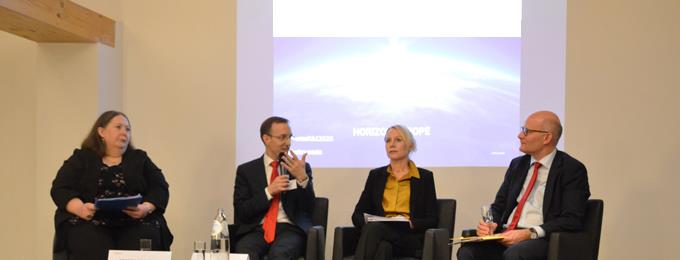At its annual R&I Seminar, SwissCore presented the Horizon Europe state of play to its Swiss stakeholders. Highlight was a speech by MEP Maria Carvalho.
From 22-24 January, SwissCore held its annual R&I Seminar. The seminar is a regular SwissCore production geared towards Swiss stakeholders, and provides them with a concentrated three-day update on the state of play of European R&I programmes and policy.
This year’s seminar was, how else could it be, dedicated to the preparations for Horizon Europe. It started on Wednesday 22 January with a pre-seminar, exclusively dedicated to Euresearch, the organisation in Switzerland providing information and access to European Framework programmes. On the menu for the close to 50 National Contact Points (NCPs) and support officers, the nitty-gritty of the new Model Grant Agreement, the reasoning and rules behind lump sum funding, and an introduction to the Open Science policy under Horizon Europe. The first day finished with a highlight, the traditional reception at the Mission of Switzerland to the European Union (EU) and a speech on the political situation between the EU and Switzerland by the Deputy Head of Mission, Gilles Roduit. Roduit emphasised once again that cooperation in research and innovation is part of the package of the Bilateral I agreements and not legally linked to the currently discussed institutional framework agreement (InstA) between Switzerland and the EU.
The discussions on the political situation and progress in the steps towards a Horizon Europe association continued on Thursday morning, not only with presentations from Maryline Maillard, Science and Technology Counsellor at the Swiss Mission to the EU, and Philipp Langer, Deputy Director-General for EU framework programmes at the Swiss State Secretariat for Education, Research and Innovation (SERI). SwissCore also welcomed a special guest, Maria da Graça Carvalho, Member of the European Parliament (MEP) for Portugal. Ms Carvalho confirmed that a Swiss participation in Horizon Europe and especially also in the monobeneficiary instruments holds benefits for the EU itself as well, but Switzerland will need to prove this with compelling examples. She further emphasised that research is a global undertaking, and an exclusion of associated countries such as Switzerland from the European Research Council (ERC) would thus not make much sense. Afternoon sessions on the day were dedicated to the content of the different Horizon Europe pillars, European partnerships and missions in pillar II, the ERC and Marie Skłodowska Curie Actions, and the pathfinder and accelerator instruments of the European Innovation Council (EIC) in pillar III. Also important for an associated country like Switzerland was the discussion with Paul Webb from the European Commission (EC), on synergies in Horizon Europe. Synergies may prove to be a challenge when a country is associated to some but not all programmes within the next multiannual financial framework (MFF) (such as the new Erasmus+ or Structural and Cohesion Funds) and certain activities are cross-funded.
The last morning of the seminar closed the circle back to the next steps towards finalisation of Horizon Europe, EU political priorities and association. Participants had the opportunity to discuss with representatives of the current Croatian and upcoming German Presidency of the Council of the EU and to hear details on the European Green Deal and its links to research and innovation. In a final debate, it became clear that there might indeed still be some battles ahead for Switzerland, even though good arguments for a full association are taking shape and a strong European Research Area (ERA) will need the Swiss institutions. The Swiss like their cheese with holes, as Philipp Langer from SERI put it, but when it comes to Horizon Europe and cooperation in R&I across Europe, a hole right in the middle just does not make sense.

